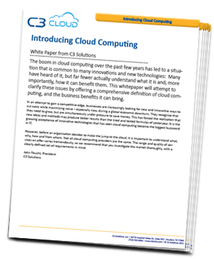 Gmail’s popularity among personal email users is certainly well-earned; it’s easy to use, cleanly designed, and rarely goes offline. (Rarely enough, that is, for personal use.) But as popular and useful as Gmail is, it’s not necessarily the best choice when you need a secure small business email system you can rely on to never go down (we've talked before about how the Google Suite isn't always the best solution). Hosted Exchange is a much more reliable alternative.
Gmail’s popularity among personal email users is certainly well-earned; it’s easy to use, cleanly designed, and rarely goes offline. (Rarely enough, that is, for personal use.) But as popular and useful as Gmail is, it’s not necessarily the best choice when you need a secure small business email system you can rely on to never go down (we've talked before about how the Google Suite isn't always the best solution). Hosted Exchange is a much more reliable alternative.
Hosted Exchange, as its name implies, is an email system hosted for your small business by a trusted IT partner. Email data is stored on a Microsoft Exchange server maintained by your IT partner and “pushed” to your computer and mobile devices over the Internet.
It’s very common for businesses to host their own Microsoft Exchange-based email in their own datacenters. Up until recently, this was the way almost all businesses—large and small—did email. Imagine transplanting those Exchange-based email servers from your business’s facility to a remote datacenter managed and maintained by an IT partner, and you have Hosted Exchange. Hosted Exchange provides all the benefits of a locally-hosted email system, minus the hassle and expense of keeping it running.
Here are some of the many reasons Hosted Exchange is a good fit for small businesses, especially in comparison to web services like Gmail:
All the Cool Kids are Doing It
Ok, so it’s been a long time since the words “cool” and “Microsoft” routinely shared sentences (if they ever did), but hear me out. In the business world, popularity often has less to do with flashy design and more to do with what works well and what makes it easier for businesses to work together.
Microsoft Exchange is still the standard when it comes to business technology. It’s not just your business that uses it; your suppliers, customers, and partners use it as well. When you share a calendar item with one of these people, you don’t have to worry about your two systems being incompatible. Ever try to share a calendar item between Microsoft Outlook and Gmail? It can cause more headaches than it’s worth.
A Hosted Exchange Email System is More Affordable than an In-House Exchange System
When your Exchange servers are managed by a third-party, it eliminates the need to invest in your own servers and pay the maintenance costs yourself. By working with a hosted IT partner, you can take advantage of economies of scale (always a good move for growing businesses). Because you don’t have to foot the bill on your own (in theory, you’re sharing it with all your IT partners’ other clients) you can gain access the functionality of a quality server, a backup and disaster recovery plan, and regular maintenance and support at a fraction of the cost you would pay for the same things in-house.
Your hosted provider’s servers will also be much more secure than your own (that’s their job!) and they will have the redundancies and backups in place to keep your email going no matter what causes the servers to go down.
Hosted Exchange is More Secure than Gmail
Microsoft Exchange comes “out of the box” with TLS encryption capability, while other services (like Gmail) make you pay extra. Encryption is a necessity for data security these days, especially for businesses that must comply with the security regulations of HIPAA, PCI DSS, or others.
Another security benefit of Hosted Exchange is that it always retains a backup copy of your emails on the server. This is in contrast to POP services that don’t retain emails on the server by default.
Hosted Exchange is More Reliable (Meaning, more Uptime)
Email is the way modern businesses communicate. No matter what your small business does, you probably can’t do it very long if your email doesn’t work. If your on-premises email server goes down (due to a power outage, for example), you’re out of luck until you can get it up and running again. Gmail suffers from downtime, as well, as is clear from this status page.
Of course, the amount of uptime you’ll get with Hosted Exchange will vary depending on your hosting partner, but there are plenty of good ones out there that have the backup systems and protocols in place to keep you in business no matter what happens.
Other Benefits of Hosted IT
Many of the benefits of turning your email system over to a hosting partner—scalability, security, reliability—are available for other IT functions, as well, such as data storage and backup. To learn more about Hosted Exchange email and other popular hosted services, download our free white paper, “Cloud Computing for Business Owners.”

